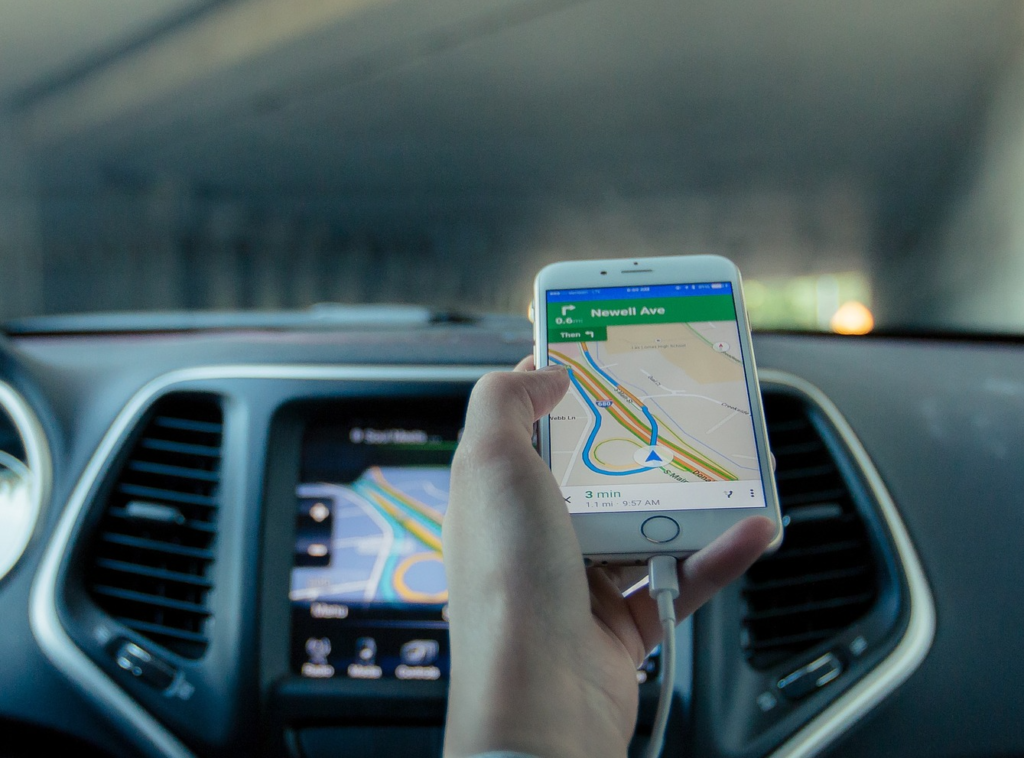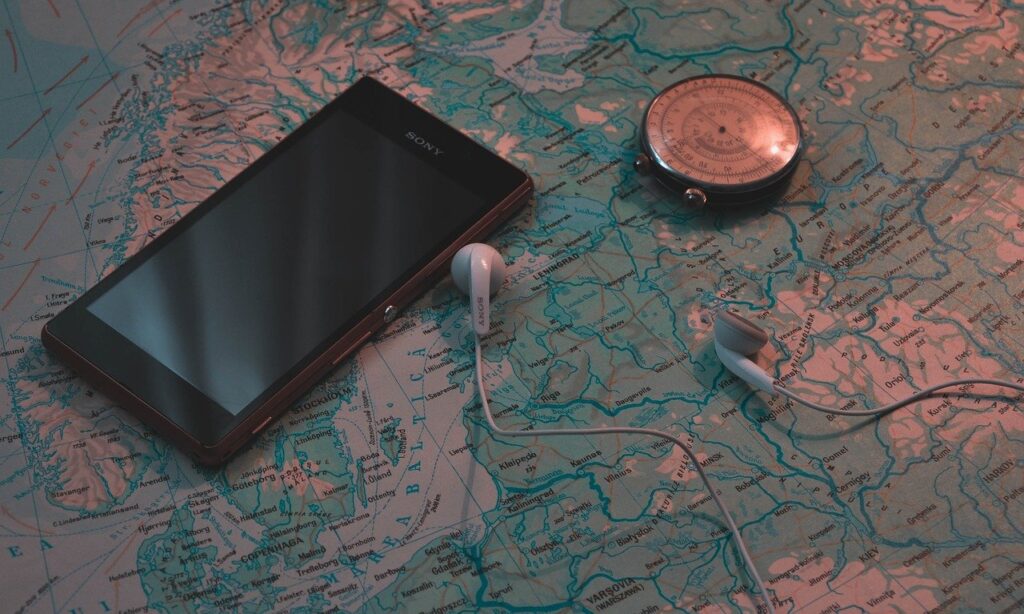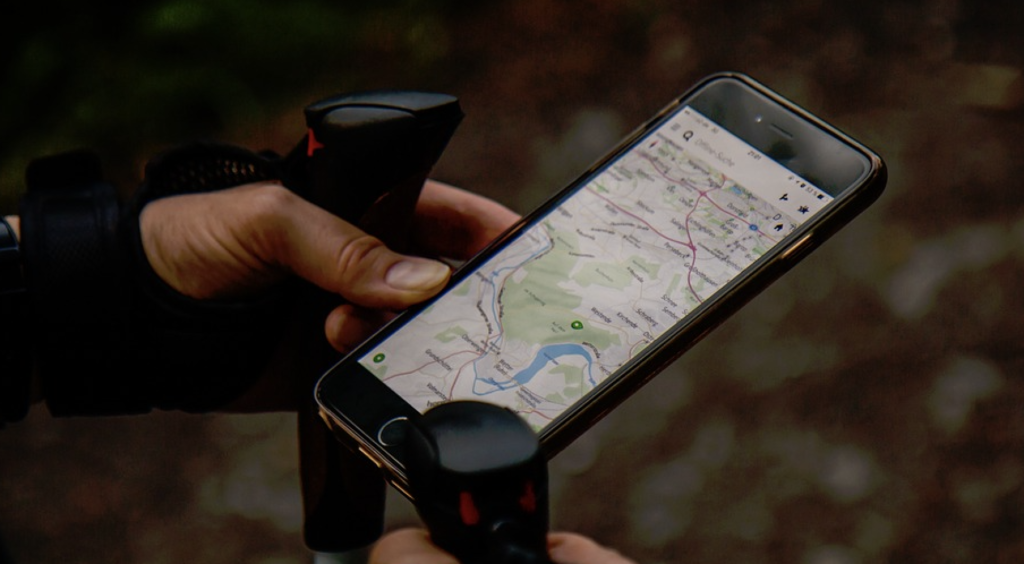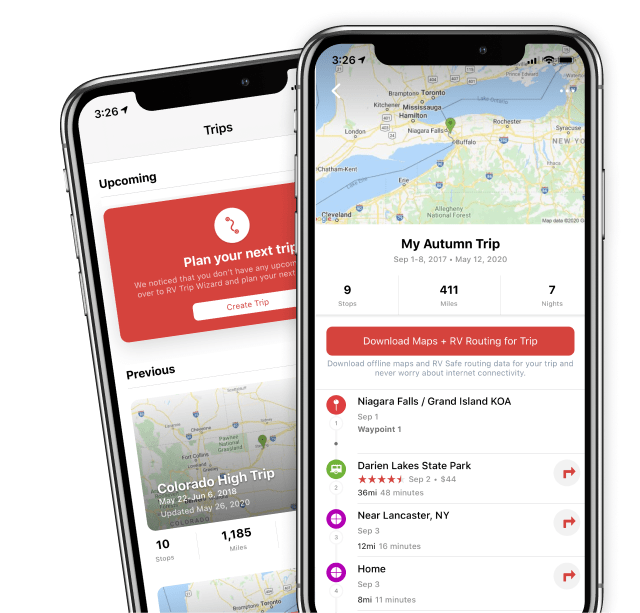The RV LIFE App and RV LIFE Trip Wizard are part of the RV LIFE Network
For years, RVers had few choices when it came to finding a GPS for safely navigating to their favorite campgrounds. Many RVs include a Garmin GPS in the dash, while Rand McNally offered a decent aftermarket option, followed by TomTom and Magellan.
That domination is rapidly changing as apps like the RV LIFE GPS & Campgrounds app, included with RV LIFE Trip Wizard, take center stage. With advancements in both size and technology, today’s modern smartphone is proving to be the best platform for the next generation of GPS apps for use in your RV.

RV GPS apps are better
1. RV GPS Apps are cheaper
With aftermarket RV GPS units selling for $300-$600, even a moderately priced RV navigation app will be significantly cheaper. As many apps are annual subscriptions, expect to get the equivalent of 5-10 years worth of app use for every stand-alone GPS you would buy.
2. They run on your new Apple or Android devices
Phones and other mobile devices are replaced fairly regularly. While some owners keep their phones for up to three years, the average iPhone or Samsung device is active for just 18 months or less. This means you are essentially replacing your GPS hardware every two years. You are less likely to do that with a dedicated GPS for your RV that costs several hundred dollars.

An RV GPS app can run on your phone
3. You won’t pay for features you don’t need
Today’s dedicated stand-alone RV GPS units often include features your phone already has. GPS devices with Bluetooth hands-free calling allow you to speak to your GPS, as you would Siri or Alexa.
However, if you have ever driven a motorhome or towed a large RV, having a conversation with your RV GPS is a distraction you cannot afford. Your smartphone already has hands-free calling.
4. It’s much easier to plan an RV trip
Aftermarket RV navigation devices make a cursory attempt at preloading a limited selection of campgrounds and points of interest data. However, you aren’t going to have enough data to be able to plan all of the necessary details of your RV trip. Nor is that easy to do while sitting behind the steering wheel.
Collaborating with your family in front of your computer with an RV trip planning tool lets you plan all of the details of your trip. When you get in your RV to take that RV vacation, simply pull the trip up on your phone or GPS enabled mobile device and hit the road.
An added bonus is that you won’t have to enter any destinations into your phone. By accessing the trips you have already created, all of the stops and destinations are already there. Just tap and go with RV-safe directions based on the RV dimensions you have entered.

Smartphones have replaced several devices including the RV GPS
5. Updating your app is automatic
For years, one of the knocks on stand-alone GPS devices is the update process. Updating a GPS through cables, Wi-Fi, or SD cards can be difficult. It can also be costly. Less expensive GPS devices can ding you for a map update fee, as high as $80 per year.
Some of the more expensive stand-alone RV navigation products include lifetime maps, but you pay heavily upfront for that feature. Lifetime can be a subjective term as well. You have no real idea how long you will have the device before it becomes obsolete, gets lost or stolen, or breaks down after the warranty period.
Most phone apps can be updated automatically and very easily. There is no need to connect any cables or cards. Very often apps will update on standard 4G or 5G, so you can update from almost anywhere.
The best RV GPS is an app
The modern smartphone has already replaced the camera, alarm clock, radio, television, and even flashlight. It’s time it replaced your RV GPS as well. One option is the RV LIFE GPS & Campgrounds app.
While available as an annual subscription, this app is also included free with every RV LIFE Trip Wizard subscription, both soon to be part of a bundle called RV LIFE Pro. You can learn more about RV LIFE Trip Wizard at www.rvtripwizard.com.


As of the first of July it’s illegal to use a cell phone in Illinois for any reason while driving, so that leaves out GPS Apps. I’m not sure why the navigation aids aren’t excluded, but that’s politics.
I find the pseudo article on cell phone GPS’ an insult to the subscribers of Campground Reviews, or for that matter any of the RV Life platforms.
We already get bombarded with ads and promos for RV Trip Wizard which we accept for our cost-free use of the many platforms. However, to disguise an ad as an objective article on the best use RV GPS system out there is as bogus as you can get.
Innumerable times our GPS has bailed us out by functioning when our phone (and their related GPS apps) have failed due to poor signal, bad reception, weather, etc…even when working the lag due to cellular reception etc is sometimes so bad that we would have missed turns which, in a Motorhome with a tow, is NOT good…GPS is still a no-brainer (for many reasons. not mentioned, incl screen size) and frankly necessary over a cell phone…also agree with prior comment about RV Life masquerading a transparently overt sales pitch as an independent analytical article…disingenuous and sad…
I found the article informative. We use both our phones and our outdated Garmin when traveling in our campervan 9 months out of the year. Both the GPS and phone are in holders while driving with the coordinates plugged in. Yes the GPS likes to do weird things in it’s old age (6) years old, but it’s invaluable when we loose all cell signal. We travel where there usually are few to no neighbors and find you should always have a back up plan. GPS, phone, and paper maps…
Vanessa, I guess travelling in a camper van makes using a phone gps easier than it does for RV”ers with substantially larger rigs having to deal with height, weight and width to name a few
Oops, he did not think of that which applies to a number of states
I disagree for the reason that on most of my RV trips I have no cellular signal 70-80% of the trip. A Garmin 770 has been great everywhere but in major-big cities like Chicago.
Obviously you don’t live in the west where some places your phone won’t get a signal….so, then you have to go back to the old Garmin. This is some bad information for those who would only rely on their phones for GPS.
The GPS apps work independly of cell signal. They have a GPS chip and work just like your Garmin, TomTom, or what ever.
I use an old cell phone for as a GPS with no sim card in it.
YOU DO NOT NEED A CELL SIGNAL TO USE A GPS APP
You can buy some apps that use offline maps. If you do, then your phone operates about the same as a PND. Usually with those apps, you have to pay for map updates. There are other free app that are constantly downloading directions and map information. IE. Waze, Google Maps, etc. They rely on good cellular data to function. Just last night 15 miles from my next turn, in PA. the phone lost data (cellular) connection and Waze showed no roads. PND worked fine. Also the phone call I was on dropped.
John I agree with your reply. We are full timers traveling through Utah and our cell phone reception is for the most part non existent. We have a Garmin RV 660 which has not failed us for many years. In addition, the screen size is extremely important.
Sure applies to all of us who live and travel in the western states
Phones still rely on nearby cell towers. Half of my trips take me to where there is no reception. Mountains, wilderness areas all have reception problems. Cell phone apps are good for populated areas but that is what I want to be away from when I am camping.
More and more manufacturers are adding CarPlay & Android car to radios. Jayco is putting them in all of their 2021s. When will you port this to CarPlay? Because as it stands, it makes no sense for me to look at a small screen and fiddle with my phone when I have a head unit that can do CarPlay. I will gladly subscribe once you do that.
The only problem with the cell phone app is when there is no service…I found this out in the mountains…no service! I primarily use the cell apps, but always have a satellite gps with me!
What does the app do for hight?
Might be great solution as long at you have a cell tower nearby but a good portion of the US has no access to a cell towers. For these you need a satelite based gps like a garmin.
The biggest drawback to an rv gps app on your phone is for older rvers who’s vision isn’t as good as it used to be. The 7″ wide stand alone gps is a lot easier to read the fine map details than a smart phone less than half the size. When you’re travelling down the road, & want to check a detail, an upcoming road name, the lane you need to be in for the next exit, etc., it’s a lot easier to quickly glance at a 7″ gps than a smart phone.
Am I correct when I say that these are wifi apps which require a constant internet connection through your phone or ipad (which requires you buy a phone number). So I rent the app, pay for phone service and a lot of data? I have tried offline apps like Sygic on my ipad where you download maps before hand. Unfortunately I could not get that one to work. I guess I needed to buy before the free app would work.
I use Copilot on my Samsung Tab-E. Will also run on a phone. It’s satellite GPS. I like the large screen. I bought back when it was a single purchase, not a subscription so I’m grandfathered in for software and map updates.
I also bought Copilot help out a long time ago but I can’t get them to let me use my lifetime laptop program. They say it is Obsolete and not supported. I guess I’m supposed to be dead by now. I still have the key which was updated in 2017.
Buy a 10 inch tablet that has a built in GPS chip
It’s like a commercial, but very true. RV Trip Wizard has been extremely useful. Even has warnings about getting fuel. We like it
Have they created a GPS app that has:
Road and Bridge max weights,
Bridge heights,
Propane restrictions?
My truck is over 10000 GVWR.
My trailer is 18,000 GVWR,
My clearance height is 12′
(and yes I do have a Class A drivers license.)
The current RV PNDs are not perfect, however; I do not remember any time it tried to route me under a low bridge, or route me through a propane restricted tunnel. (Where an app has done both.)
We use apps (phone and computer) to do our planning.
We use the RV PND handle road restrictions.
I travel in many locations where cellular service is very spotty at best and is often non-existent for lengthy periods of time and distance. Does the GPS functionality of your phone app continue to function normally despite the lack of data from its server for a period that may last several hours? I frequently use a standalone GPS for such situations. Thanks.
What is RV PND?
Does it work with no cell reception? If not, old standalone gps or paper maps?
Portable Navigation Device
Better a tablet with GPS. Larger screen that’s much easier to read with quick glances and using one frees up your phone for its usual main duties.
The Rand Mcnally RV Overdryve is tablet based. It includes everything stated here, and is Android based so it can be used for other functions as well and doesn’t rely on cell coverage for trip planning.
However, with that said, the mount designed for it is useless, it shakes too much, the tablet is too heavy for the mount. The only things I found it useful for is to connect to the wifi backup camera for hooking up the 5th wheel, and the screen size is more user friendly for the maps, but other than that, it is not worth the price I paid for it.
I have the RV Life app, and for $50 a year, it is worth the cost, especially if you have an LTE based tablet to work with. Using it on an iphone with the small screen is not the best unless you can use CarPlay to put the map on the large screen. Haven’t tried it yet, but since it is using GoogleMaps for the routing engine, it probably works fine.
Does the app provide information for Australia?
It does not.
Sitting on the fence here. You answered a june 3 question about Australia but have not addressed all the other questions. Everyone here are asking about cell coverage and do you need towers and connectivity?
I have seen people say that a tablet with gps works but a tablet with out gps or a sim card only relies on wifi or some other method to get the data.
I have also wondered about the fact that Garmin and Magellan have big antennas that stick to the windshield but the phone is using a tiny one inside?
I am thinking of buying something this week like a android $1000 dollar tablet to use with your app but if it doesn’t work than I will have to spend another $600 on a Garmin.
Please address these questions.
I think it is pretty obvious from the lack of replies to questions about cellular service that the app does not work without it. I am also looking for a solution when traveling across the country to places like Yellowstone and Mt Rushmore, which I doubt will have cellular service for my entire trip.
RV Life doesn’t have the park we are staying in.
I am guessing you are going to answer all the unanswered questions in another article when it comes to RV Trip Wizard cell phone app
Nope, I diss agree, I’ll take my Garmin RV760LM over cell apps. Cell phones require a tower/internet. GPS use the satellites. My Garmin uses my weight, width, length, height to plane each trip, and has 4+ free updates each year.
I have noticed only disagreements in the comments.
I offered the same opinions of disagreement and mentioned the danger of such advise.
My comment was ignored and never posted. As I submitted it about 4 months ago when this article was posted at an earlier date .
Modern cell phone use GPS too. I can use google maps anyplace I do not have cell service, google gives you the option to download the maps and information for the area you will be traveling to. When you lose cell service you still have maps and movement is tracked with GPS satellites. Just like a garmin.
Some smartphones have satellite-based global positioning system (GPS) enabled chips in them. For example, the chip in my Samsung Galaxy Note 8 can receive a satellite GPS signal. When I go to the “Location” section in my phone it says, “Location may use sources like GPS, Wi-Fi, mobile networks, and sensors to help estimate your device’s location.” The more of those sources the phone is able to simultaneously detect, the more accurate the location will be.
If a phone has a GPS enabled chip, you should be able to identify where you are at all times as long as the map that includes your current location has been installed. Maps are downloaded using cell and/or Wi-Fi data, so, if you get out of range of both of those, then move to a location that is outside of all the maps installed in your phone, you will not be able to use the GPS signal.
If you are going to run biased advertising, it should be marked as such.
Yes, phone apps are better than nothing. But a phone app is a poor substitute for a real RV GPS. When cell service is spotty or non existent, the app that is supposed to be protecting you is worthless and you might not even know it!!
There are pluses & minuses to each platform for me it is all about having a big screen that I can see immediately at a glance while driving. Cell phone is to small for my use. Also it is far cheaper to buy a new GPS than a new cell phone.
As others have stated, there are many reasons why an app on your phone is NOT better than a separate GPS:
1. where there is no phone service (happens to me quite often)
2. smaller screen is harder to see
3. states where using the phone is illegal while driving
4. using the phone to listen to podcasts, music, or other features while at the same time trying to navigate an app
5. you have to pay for using the data charges on your phone while you are driving – no wifi.
6. doesn’t include needed info – like low bridges, propane restrictions, etc.
I often use WAZE on my phone in addition to the Garmin, because WAZE is interactive and tells you traffic conditions that can change while you are traveling. However, not while I am driving, only when I’m the navigator. I like the Garmin because you can set it and forget it. If I stop, it just resumes when I start up again, unlike my phone which keeps trying to tell me to make a U-turn when I’m in the restroom, so I have to turn it off and then restart it when I get back in the car.
I appreciate that there are different strokes for different folks – but a well balanced article would include both sides rather than sounding like a commercial.
Thanks we’ll gladly keep our Garmin. It has actually taken us to some interesting places …. Off main roads, 8 miles up into the redwood forest, etc. yeah not all roads have names but at least they show up on the screen so we know where to turn if sorta lost in the woods. LOL getting lost in the woods aint all that bad sometimes!!!! Safe travels all.
You’d think the author would have eaten his crow. Obviously doesn’t get out much.